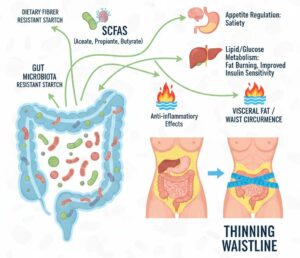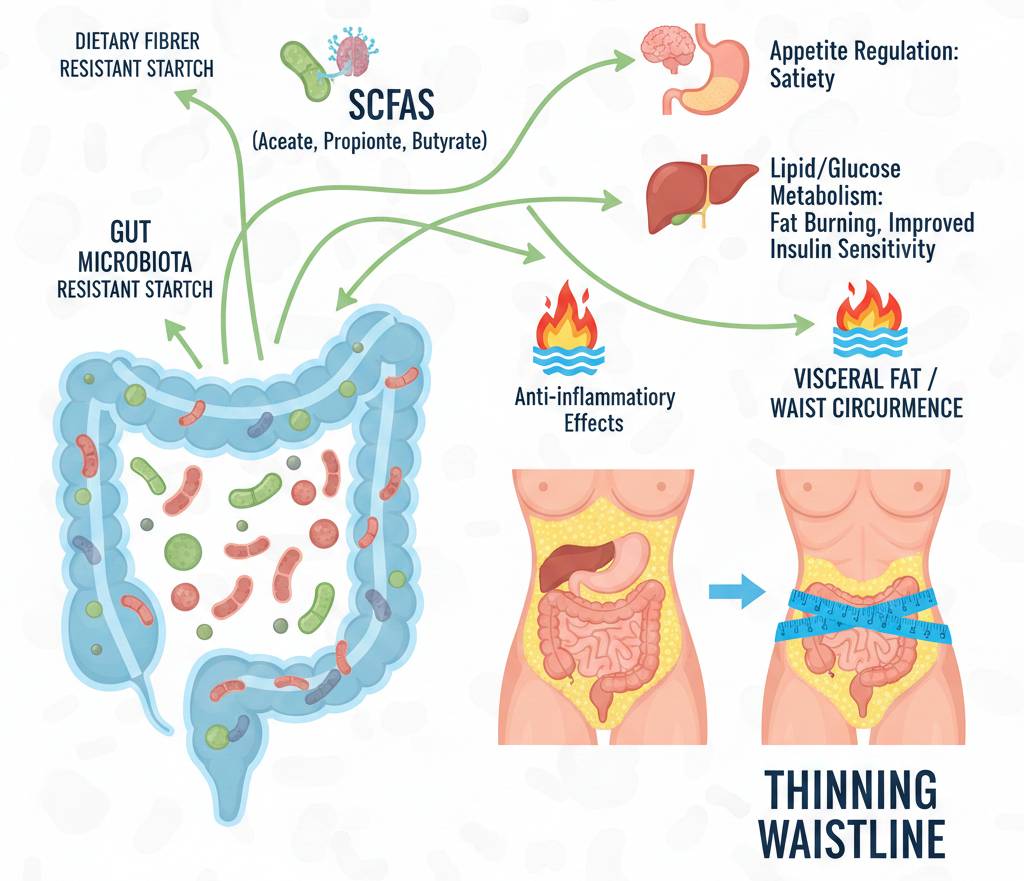
Yes, Short-Chain Fatty Acids (SCFAs) are increasingly recognized for their potential role in helping the body reduce and manage visceral fat, the fat stored deep within the abdomen around organs.
Research has shown a negative correlation between SCFA levels (specifically in feces) and adiposity parameters, including visceral adipose tissue (VAT) and waist circumference. In other words, individuals with lower concentrations of SCFAs tend to have higher visceral fat.
How SCFAs May Help Reduce Visceral Fat
SCFAs, primarily acetate, propionate, and butyrate, are produced when gut bacteria ferment dietary fiber and resistant starch in the colon. These molecules then interact with the body through several potential mechanisms:
- Appetite and Energy Regulation: SCFAs, particularly acetate and propionate, can reach the bloodstream and act on the brain and gut. They stimulate the release of gut hormones (like GLP-1 and PYY) that promote satiety (feeling full) and potentially decrease overall energy intake, which is essential for reducing all body fat, including visceral fat.
- Lipid and Glucose Metabolism: SCFAs appear to play a beneficial role in regulating the body’s metabolism of fats and glucose. They may:
- Increase Fat Burning: Studies suggest SCFAs can regulate fat metabolism by increasing fat oxidation (burning) and decreasing fat storage.
- Improve Insulin Sensitivity: SCFAs can help improve the body’s response to insulin, which can reduce the fat synthesis often triggered by high insulin levels (hyperinsulinemia).
- Anti-inflammatory Effects: Visceral fat is often associated with chronic, low-grade inflammation throughout the body, which contributes to metabolic diseases. Butyrate, in particular, is known for its anti-inflammatory properties, helping to suppress pro-inflammatory signaling pathways. Reducing systemic inflammation can create a more favorable environment for metabolic health and weight loss.
The Gut Microbiota Connection
The link between SCFAs and visceral fat often involves the composition of the gut microbiota.
- Low SCFA Producers: People with visceral obesity have sometimes been found to have a different gut microbiota composition, including a lower abundance of certain SCFA-producing bacteria compared to non-obese individuals.
- Dietary Intervention: Increasing the intake of fermentable fibers (known as prebiotics) through supplements like Inulin, Acacia Fiber, or foods like legumes, oats, fruits, and vegetables encourages the growth of these beneficial bacteria, thereby increasing the natural production of SCFAs. This dietary strategy is a promising avenue for mitigating obesity and related metabolic issues.


Leave a Reply